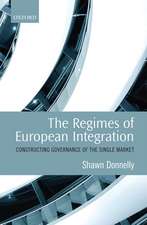Political and Legal Perspectives of the EU Eastern Partnership Policy
Editat de Tanel Kerikmäe, Archil Chociaen Limba Engleză Hardback – 29 ian 2016
| Toate formatele și edițiile | Preț | Express |
|---|---|---|
| Paperback (1) | 640.06 lei 43-57 zile | |
| Springer International Publishing – 30 mar 2018 | 640.06 lei 43-57 zile | |
| Hardback (1) | 646.30 lei 43-57 zile | |
| Springer International Publishing – 29 ian 2016 | 646.30 lei 43-57 zile |
Preț: 646.30 lei
Preț vechi: 760.35 lei
-15% Nou
123.67€ • 129.47$ • 102.33£
Carte tipărită la comandă
Livrare economică 07-21 aprilie
Specificații
ISBN-10: 3319273817
Pagini: 279
Ilustrații: VIII, 279 p. 8 illus. in color.
Dimensiuni: 155 x 235 x 21 mm
Greutate: 0.58 kg
Ediția:1st ed. 2016
Editura: Springer International Publishing
Colecția Springer
Locul publicării:Cham, Switzerland
Public țintă
ResearchCuprins
TanelKerikmäe, Dimensions and Implications of Eastern PartnershipPolicy: Introduction.- Vlad Vernygora, DavidRamiro Troitiño and Sigrid Västra, The Eastern Partnership Programme: is pragmatic regional functionalism workingfor a contemporary political empire?.- TatjanaMuravska and Alexandre Berlin, Towards a New European Neighbourhood Policy(ENP): What Benefits of the Deep and Comprehensive Free Trade Agreements(DCFTAs) for Shared Prosperity and Security?.- Olga Batura and Tatjana Evas, Information Society goesEast: ICT policy in the EU’s Eastern Partnership cooperation framework.- Yuri Misnikov, Democratizating theEastern Partnership in the Digital Age: Challenges and Opportunities ofPolitical Association beyond the Language of Official Texts.- Katrin Nyman-Metcalf and TarasRepytskyi, Exporting good governance via e-Governance: Estoniane-Governance support to Eastern Partnershipcountries.- Kristi Joamets, EasternPartnership and Family Law.- Lehte Roots,Mapping the Migration Issues – EaP Policy as a Tool for Regulation.- Hamed Alavi, European Union andprotection of environment in Eastern Partnership Countries.- Roman Petrov, Implementation ofassociation agreements between the EU and Ukraine, Moldova and Georgia: Legaland constitutional challenges.- EvhenTsybulenko and Sergey Pakhomenko, The Ukrainian Crisis As A Challenge ForThe Eastern Partnership.- Thomas Hoffmann,Europeanisation of Private Law in Ukraine: Comparisons in the Field of Lawof Obligations.- Archil Chochia and JohannaPopjanevski, Change of Power and Its Influence on Country’s EuropeanizationProcess. Case Study: Georgia.- DaliGabelaia, Georgia’s right to ‘European Dream’.- Dr. Mamuka Andguladze, European Self-Regulations Mechanism: TheCase Study for Georgia.- Onoriu Colăcel, Europeon Romanian-speaking TV in the Republic of Moldova.- Eunice Omolola Olaniyi and Gunnar Klaus Prause, Baltic-RussianInnovation Cooperation in the Context of EU Eastern Partnership.
Notă biografică
Prof. TanelKerikmäe is Director of Tallinn Law School at Tallinn University of Technology.
Dr. Archil Chochia isa researcher at Tallinn Law School of Tallinn University of Technology
Textul de pe ultima copertă
This book examines EU Eastern Partnership taking into account geopolitical challenges of EU integration. It highlights reasons for limited success, such as systematic conflict of EU External Action. In addition, the book analyses country-specific issues and discusses EaP influence on them, investigating political, economic and social factors, while seeking for potential solutions to existing problems. The reluctance of the Eastern countries to the European reforms should not reduce political pro-activeness of the EU. The authors suggest that EaP strategies should be reviewed to be more reciprocal and not based solely on the EU-laden agenda. This book is one of the good examples of cooperation between scholars not only from EaP and EU countries, but also from different disciplines, bringing diversity to the discussion process.
Caracteristici
Recommendation for the future strategies
Includes diverse and interdisciplinary insight to the EaP policy
Includes EaP countries' experiences and critique
Wide range of professional authors directly related to EU studies and having close ties with EaP countries
Descriere
This book examines EUEastern Partnership taking into account geopolitical challenges of EUintegration. It highlights reasons for limited success, such as systematicconflict of EU External Action. In addition, the book analyses country-specificissues and discusses EaP influence on them, investigating political, economicand social factors, while seeking for potential solutions to existing problems.The reluctance of the Eastern countries to the European reforms should notreduce political pro-activeness of the EU. The authors suggest that EaPstrategies should be reviewed to be more reciprocal and not based solely on theEU-laden agenda. This book is one of the good examples of cooperation betweenscholars not only from EaP and EU countries, but also from differentdisciplines, bringing diversity to the discussion process.















